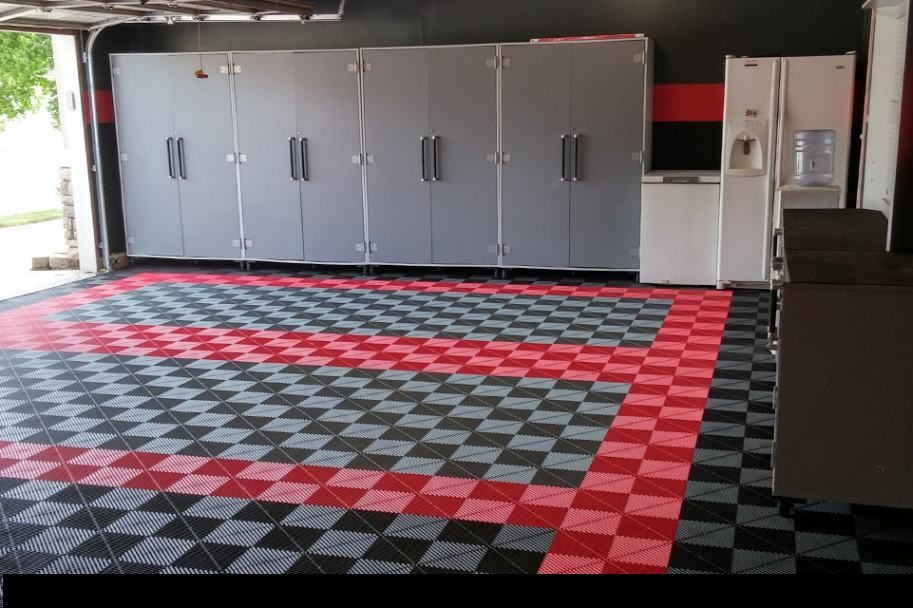100% Virgin Polypropylene Modular Floor Tiles vs PVC vs Rubber vs Epoxy Garage Flooring
At GVT Garage Gear, we understand the importance of choosing the perfect flooring solution for your garage—whether it’s to showcase a prized collection of vehicles, create an inspiring workspace, or protect your floor from the demands of automotive activities. When comparing flooring options, 100% virgin polypropylene modular floor tiles stand out as the ultimate choice over PVC floor tiles, rubber floor tiles, and epoxy flooring. Here’s why:
1. Unmatched Durability & Strength
- Polypropylene (PP) Tiles:
- Engineered for maximum strength, polypropylene tiles easily support heavy vehicles, including supercars and classics, without cracking or warping.
- Impact-resistant, making them ideal for garages where tools and equipment may be dropped.
- PVC Tiles:
- Softer material prone to dents and warping under heavy weight or consistent use.
- Rubber Tiles:
- Durable for foot traffic but less suited for heavy vehicle loads, as they can deform over time.
- Epoxy Flooring:
- Strong surface capable of withstanding heavy vehicles, but can chip or crack under high impact (e.g., dropped tools).
2. Exceptional Chemical Resistance
- Polypropylene:
- Resistant to oil, grease, fuel, and other automotive chemicals, ensuring spills don’t damage the surface or leave stains.
- PVC:
- Moderately resistant but vulnerable to staining and degradation from prolonged chemical exposure.
- Rubber:
- Susceptible to breakdown when exposed to oils and fuels, often leaving permanent marks.
- Epoxy Flooring:
- Highly chemical-resistant but may stain if spills are not cleaned promptly.
3. Superior Temperature Stability
- Polypropylene:
- Handles extreme temperatures without shrinking, expanding, or becoming brittle, making it ideal for garages in diverse climates like Australia’s.
- PVC:
- Prone to expansion and contraction with temperature changes, causing gaps or unevenness.
- Rubber:
- Softens or hardens depending on the temperature, potentially creating an unstable surface.
- Epoxy Flooring:
- Can withstand temperature variations but may become slippery in extreme cold or hot conditions.
4. Aesthetic Excellence
- Polypropylene:
- Available in a wide range of vibrant colors, finishes, and textures, from diamond plate to vented designs, to create a stunning and personalized garage floor.
- Fade-resistant, maintaining its polished look for years.
- PVC:
- Limited color and design options; prone to discoloration under UV exposure.
- Rubber:
- Basic black or grey finishes dominate, with minimal customization options.
- Epoxy Flooring:
- Offers a sleek, glossy finish with customizable colors and patterns but can dull or yellow over time without proper maintenance.
5. Low Maintenance, Long Life
- Polypropylene:
- Easy to clean with a mop or hose; resistant to moisture, odors, and mold, ensuring a pristine and professional garage environment.
- PVC:
- Requires frequent cleaning; can absorb moisture, leading to mold or odors.
- Rubber:
- Absorbs dirt, oils, and moisture, making maintenance more time-consuming.
- Epoxy Flooring:
- Relatively low maintenance but requires periodic resealing to maintain its shine and protective qualities.
6. Environmentally Conscious
- Polypropylene:
- Made from 100% virgin material for consistent quality and durability, with potential for recycling.
- PVC:
- Less environmentally friendly, as production involves harmful chemicals.
- Rubber:
- Often made from recycled materials but breaks down faster, resulting in a shorter lifecycle.
- Epoxy Flooring:
- Not environmentally friendly due to the production and curing processes, which release VOCs (volatile organic compounds).
7. Effortless Installation
- Polypropylene:
- Lightweight, interlocking design ensures quick and simple installation over most existing surfaces.
- PVC:
- Heavier and may require adhesives, increasing installation time and complexity.
- Rubber:
- Often requires adhesives or precise cutting, making installation labor-intensive.
- Epoxy Flooring:
- Requires professional installation with a multi-step process (cleaning, priming, coating, and curing), resulting in longer installation time.
8. Outstanding Cost vs. Value
- Polypropylene:
- While the initial investment may be moderate, its long-term durability, low maintenance, and aesthetic appeal provide exceptional value.
- PVC:
- Lower upfront cost but shorter lifespan and potential for costly maintenance reduce overall value.
- Rubber:
- Affordable but lacks the durability and sophistication needed for premium garages, making it less cost-effective in the long run.
- Epoxy Flooring:
- Higher initial cost and requires periodic maintenance and resealing, increasing overall lifetime expenses.
The GVT Advantage
At GVT Garage Gear, we believe every garage should reflect the passion and pride of its owner. That’s why we recommend 100% virgin polypropylene modular floor tiles as the superior choice for creating a garage space that is durable, stylish, and built to last.
With these tiles, you can:
- Protect your valuable vehicles and tools.
- Enjoy a clean, chemical-resistant workspace.
- Enhance your garage’s aesthetic appeal with customisable designs.
IMPORTANT NOTE:
At GVT Garage Gear we are not suggesting that a 100% Virgin PP Flooring is the only viable option as we may recommend that a “professionally prepared and installed” EPOXY Floor is more appropriate dependent upon the floorings primary purpose and use.
Invest in flooring that matches your vision for a bespoke, automotive-themed garage.
Contact us today to learn more or to request a FREE no-obligation consultation!



Leave a Reply